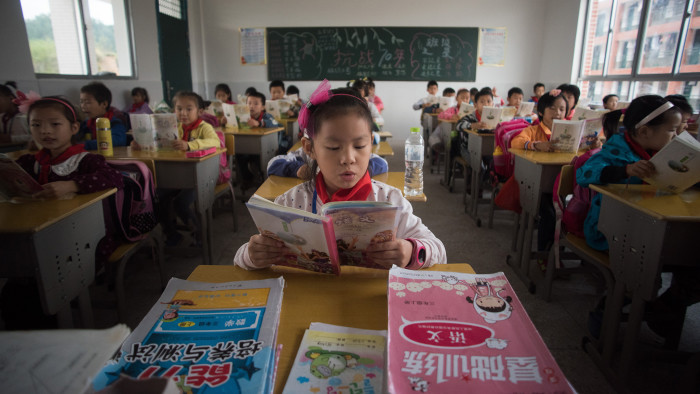Asia’s approach to learning spawns a global industry

Roula Khalaf, Editor of the FT, selects her favourite stories in this weekly newsletter.
When a talented tutor is offered $11m to jump ship to a rival teaching house, you appreciate the importance Hong Kong places on education.
And why not? Education is big business across Asia. Ditto profits: gains at Beacon Group, current home of the fought-after super-tutor Lam Yat-yan, almost doubled in the two years to the end of July and there are plenty of people who would argue this is money well spent.
Asia’s love of learning has spawned books such as US writer Amy Chua’s Battle Hymn of the Tiger Mother , about the use of discipline in child rearing, and has inspired much hand-wringing in the west — Singaporean methods and teachers, for example, have been employed to shake up maths teaching in the UK. The Asian approach has inspired envy, griping and even lawsuits. In November 2014, a group called Students For Fair Admissions Inc filed a lawsuit, which is being contested, against Harvard College in the US alleging its admissions office was discriminating against Asian and Asian-American applicants.
But more than anything, demand from Asia has spawned a multibillion-dollar industry of tutors, agents, online courses and staid British schools setting up shop in humid climes far from their rainy playing fields at home.
“There is huge demand for the British brand,” says Richard Howorth, a former hedge fund manager who is looking to recruit teachers for an online tutorial company he is setting up.
Lam and Beacon are tiny cogs in the private tutoring wheel, an industry forecast to be worth nearly $200bn globally by 2020, according to Global Industry Analysts. The consultancy pinpoints Asia-Pacific as the biggest and fastest-growing market, with a projected compound annual growth rate of 10.7 per cent over the period.
Children whose education is not supplemented privately are in the minority in parts of Asia. Data from the Hong Kong Federation of Youth Groups’ Youth Research Centre show 72 per cent of secondary school students in Hong Kong in 2012 used private tutors — still behind Taiwan (75 per cent on 2010 numbers) but ahead of South Korea’s 71 per cent (2011) and Japan’s 53 per cent (2007).
Tutorial offices proliferate across the continent: crammed into cheek-by-jowl office blocks in Hong Kong. In far-flung reaches of Japan it can be easier to find a tutor than a coffee.
Online learning is proliferating too: among recent entrants is a trading subsidiary of the UK’s Eton College, which has formed partnerships with schools in China. Eton says profits from the venture will be decanted into its bursary programme.
Other venerable British schools have gone further. Winston Churchill’s alma mater, Harrow, has replicated its playing fields in China, Hong Kong and Thailand; boaters and bluers remain de rigeur, humidity and heat notwithstanding. Dulwich College is in Singapore, China and South Korea, while Marlborough College can be found in Malaysia. Haileybury has taken the daring step of opening its doors in Kazakhstan.
This expansion has it risks. In 2005, Dulwich College severed ties it had maintained for eight years with its franchise in Thailand after a row over management at the Thai school.
In total, British private schools have set up 44 overseas campuses, educating almost 25,000 pupils, according to the Independent Schools Council — more than double the 2012 figure.
For universities, big brains mean big fees, but before they can persuade the finest minds to enrol, so-called placement agents pop up to take their cut. Ranging from honest brokers to the plain unscrupulous — again, operating both in physical premises and online — they promise to scour the region to bring students and universities together. Some take a fee from universities, others from students, and more than a few from both: tales abound of money disappearing with no offers of places in return.
Others, for a handsome fee, will write and submit essays to educational institutions in fluent English for students whose grasp of the language is far more rudimentary and who then struggle on enrolling.
Indeed, so popular and lucrative is the education business that even travel agents are getting in on the act: one parent recounts a tale of seeing one “with posters on its walls of schools that no longer exist”.
Comments